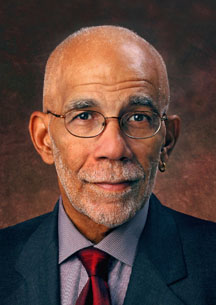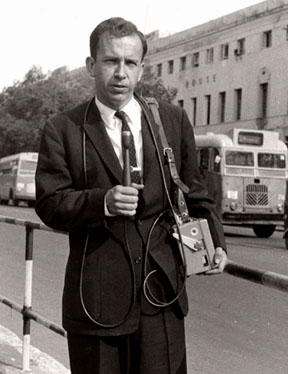 |
Office of Media Relations | |||
|
POSTPONED |
News | |||
|
Welles Hangen Award
60 Minutes Correspondent Ed Bradley to Receive Journalism Award
POSTPONED: Due to scheduling conflicts, the award ceremony announced in this release has been postponed until the fall semester. See update: 05-107p (distributed April 17, 2006). PROVIDENCE, R.I. — Emmy Award-winning CBS News correspondent Ed Bradley will visit Brown University to receive the Welles Hangen Award for Superior Achievement in Journalism on Friday, April 21, 2006. Brown President Ruth J. Simmons will present the award to Bradley, a 25-year veteran of 60 Minutes, who will make brief remarks and then respond to questions from the audience. 
“A Conversation with Ed Bradley” will begin at 4 p.m. in Sayles Hall, located on The College Green. The ceremony is free and open to the public. Created in 1993, the award honors the memory of Welles Hangen, a 1949 Brown graduate, journalist and NBC Hong Kong Bureau chief, who was captured and executed by Viet Cong and Khmer Rouge guerrillas while covering the invasion of Cambodia during the Vietnam War. Past recipients include Andrea Mitchell, Sylvia Poggioli, Dan Rather, Peter Jennings, Tom Brokaw, John Chancellor, Christiane Amanpour and Morley Safer. Ed Bradley The 2005-06 broadcast season marks Bradley’s 25th year as a 60 Minutes correspondent. He joined the broadcast during the 1981-82 season. He also anchors and reports hour-long specials. Bradley joined CBS News as a stringer in its Paris bureau in September 1971. A year later, he was transferred to the Saigon bureau, where he remained until he was assigned to the CBS News Washington bureau in June 1974. He was named a CBS News correspondent in April 1973 and, shortly thereafter, was wounded while on assignment in Cambodia. In March 1975, he volunteered to return to Indochina and covered the fall of Cambodia and Vietnam. Bradley served as White House correspondent and as a principal correspondent for CBS Reports, before joining 60 Minutes. He also anchored the CBS Sunday Night News from 1976 to 1981 and Street Stories from 1992 to 1993. Before coming to CBS News he was a reporter for WCBS Radio in New York and for WDAS Radio in Philadelphia. Bradley has received numerous awards throughout his career, including 19 Emmys, the latest for a segment that reported the reopening of the 50-year-old racial murder case of Emmett Till. He was honored with a Lifetime Achievement Emmy in 2003 and given the Paul White Award by the Radio/Television News Directors Association in 2000. Bradley also received the Robert F. Kennedy Journalism Awards grand prize and television first prize for CBS Reports: In the Killing Fields of America (January 1995), a documentary about violence in America, for which he was co-anchor and reporter. His coverage of the plight of Cambodian refugees, broadcast on the CBS Evening News with Walter Cronkite and CBS News Sunday Morning, won a George Polk Award in journalism. He also received a duPont citation for a segment on the Cambodian situation broadcast on CBS News' Magazine series. Welles Hangen The Welles Hangen Award was created at Brown University by President Vartan Gregorian in 1993 to honor journalists for distinguished service. 
Putnam Welles Hangen, a member of the Brown class of 1949, joined the New York Times in 1950 as a correspondent in the Paris bureau. In 1953, at the age of 23, he established a bureau in Ankara, becoming the Times’s reporter in Turkey, then moving to Moscow. He resigned from the Times and made the move to television in 1956, taking over the Cairo bureau for NBC. The network sent him to New Delhi in 1960, to Germany in 1964, and finally to Hong Kong as bureau chief. Hangen was last seen alive on May 30, 1970, when he and his NBC crew were traveling with a crew from CBS about 25 miles south of Phnom Penh. Three miles after passing its last checkpoint, the group was attacked, and the CBS reporter and crew were killed. Hangen and his NBC crew were surrounded and led away; they were executed three days later. For the first few years after Hangen disappeared, fellow journalists continued to investigate. Hangen’s wife, Pat, began writing and speaking about journalists who were missing in Cambodia and Vietnam, and continued to press for a resolution. War and political upheaval in Cambodia kept searchers away until 1991, when an NBC crew returned. In 1992, a team of U.S. Army technicians visited the site and found remains that DNA testing confirmed were those of Hangen. In January 1993, 23 years after he disappeared, Welles Hangen was laid to rest with a 21-gun salute at Arlington National Cemetery. His papers, notes, scripts, tapes, and films are now part of the permanent collection of the Museum of Radio and Television in New York City, given by NBC in 1978. ###### Media Relations Home | Top of File | e-Subscribe | Brown Home Page | ||||